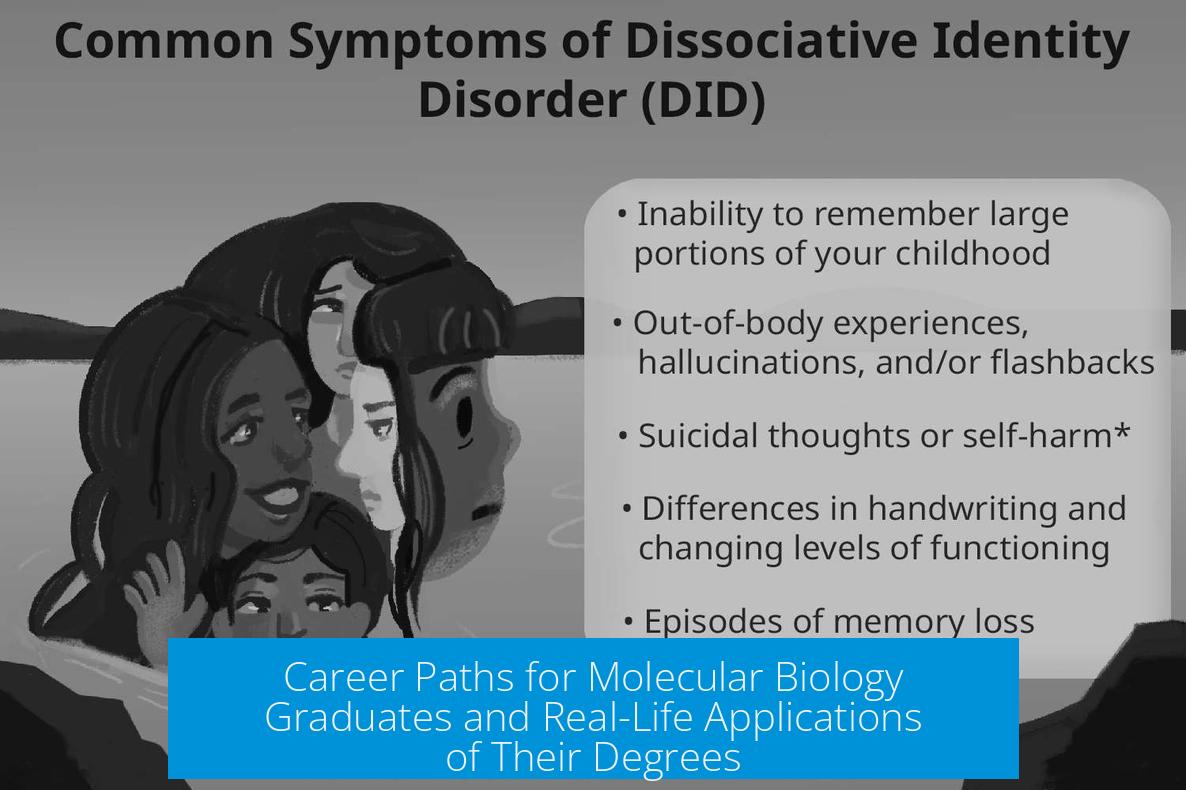What Did You Do With Your Undergraduate Molecular Biology Degree?

An undergraduate molecular biology degree opens diverse career paths including pharmaceutical production, research, healthcare coordination, startups, academia, and more. Graduates often leverage their specialized knowledge in multiple sectors. This article explores typical career trajectories and unique opportunities prompted by this versatile degree.
Pharmaceutical Production and Research Opportunities
Many graduates begin careers in pharmaceutical production. Initial roles focus on scaling up drug manufacturing from laboratory to industrial scale. This process requires understanding chemical synthesis, quality control, and regulatory standards. Such positions build practical skills in drug development.
Research positions often involve studying viral proteins, especially RNA viruses. Roles in academic or private labs engage candidates in molecular characterization and experiments related to virus-host interactions. These positions suit graduates interested in virology and infectious diseases.
Flow cytometry is another laboratory technique widely used in preclinical drug trials. Molecular biology undergraduates may work with flow cytometry to analyze cell populations, detect biomarkers, and evaluate drug responses in animal studies. This hands-on experience is valuable in the drug development pipeline.
- Scale-up pharmaceutical production
- Research on RNA virus proteins
- Flow cytometry in preclinical drug trials
Careers in Organ Transplant Coordination
Some graduates transition from bench science to healthcare coordination roles. For example, organ transplant coordinators manage organ allocation and transplantation logistics. This job may offer a significant salary increase compared to entry-level laboratory jobs. Skills in biology, attention to detail, and communication are critical.
Startups and Technology Development
Undergraduate experiences frequently include startup environments. In some cases, students contribute to patented technologies, such as TCR-sequencing platforms, while completing their thesis. Graduates can continue with these startups in diverse roles encompassing production, research, and management. This fosters a blend of scientific and entrepreneurial skills.
Some alumni even create new platforms for scientists to share protocols, optimization strategies, and negative results, addressing gaps in conventional academic publishing. This innovation reflects an entrepreneurial spirit influenced by direct exposure to scientific academia and industry trends.
- Patented TCR-sequencing technology involvement
- Four years of startup work including R&D and production
- Founding tech platforms for scientific collaboration ([www.scifind.net](https://www.scifind.net))
Academic Research and Career Progression
Undergraduate research can span the last two years of study, leading to positions as research associates or project managers after graduation. Long-term lab employment supports skill refinement and publication opportunities, crucial for graduate school applications.
Graduates often pursue advanced degrees, aiming to publish their research during or after graduate studies. Supplementary minors in Chemistry and Computer Science can enhance a molecular biology graduate’s competitiveness in interdisciplinary fields.
Direct Industry Employment
Many molecular biology graduates enter industry immediately after graduation. Molecular diagnostics firms are prevalent and offer accessible opportunities for lab-based roles. These positions may be less research-intensive but provide vital experience in applied molecular techniques.
Forensic and Biotech Field Service Careers
Crime lab DNA units employ molecular biology graduates for forensic DNA analysis. This role involves identifying genetic material related to legal investigations. Experience in this field opens paths to biotech field service positions where professionals support equipment and technology clients directly.
- Crime lab DNA unit roles post-BS degree
- Biotech field service employment
Career Changes Outside Science
Some molecular biology graduates switch careers entirely, such as becoming massage therapists. Diverse interests and personal decisions shape these non-traditional paths.
Graduate Education and Long-Term Industry Roles
Pursuing a master’s degree can lead to research associate roles in academia or industry. Some graduates with master’s degrees secure positions requiring PhD-level competencies without obtaining the doctorate, aided by substantive experience and employer recognition.
Advice from professionals underscores entering industry promptly to build practical expertise and career progression opportunities.
Technology Focus and Graduate Studies Choices
Graduates may spend time as research technicians before deciding between startup careers and graduate school. Graduate education can have mixed outcomes, offering skill enhancement and credentials while posing challenges such as comprehensive exams.
Teaching and Education Careers
Another path involves teaching science or math at the high school level. This usually requires additional qualifications such as a post-degree bachelor of education. These roles apply molecular biology knowledge in pedagogical settings.
Research Technicians and Future Academic Plans
Some graduates remain research technicians while preparing to begin doctoral studies in related fields like animal science. This highlights a continuing commitment to research and specialization.
Summary of Career Paths for Molecular Biology Graduates
| Sector | Typical Roles | Key Skills |
|---|---|---|
| Pharmaceutical & Research Labs | Production scale-up, viral protein research, flow cytometry | Lab techniques, data analysis, regulatory knowledge |
| Healthcare Coordination | Organ transplant coordinator | Biology knowledge, communication, logistics |
| Startup & Tech Development | R&D, production, entrepreneurship, platform development | Innovation, management, technical skills |
| Academia & Graduate Studies | Research associate, project manager, grad student | Research design, publishing, interdisciplinary skills |
| Industry & Diagnostics | Molecular diagnostics technician, biotech field service | Applied molecular biology, client support |
| Forensics | DNA analyst | Genetics knowledge, legal process understanding |
| Education | High school science/math teacher | Pedagogical skills, subject mastery |
| Non-science Careers | Massage therapist, others | Alternative professional skills |
Key Takeaways
- Molecular biology degrees enable work in research, industry, healthcare, and education.
- Graduates often start in labs performing specialized techniques like flow cytometry or viral research.
- Many find higher-paying roles in related sectors such as organ transplant coordination.
- Startup and entrepreneurial endeavors are common, leveraging technical and managerial skills.
- Advanced degrees enhance prospects in academia and higher-level industry positions.
- Careers may shift outside science, reflecting individual interests.
- Teaching and forensic roles provide additional career diversity.
What Did You Do with Your Undergraduate Molecular Biology Degree? Real Stories and Career Twists
Did you ever wonder what paths an undergraduate Molecular Biology degree can lead to? Spoiler alert: it’s not just pipetting in a lab all day. This degree opens doors to diverse careers, ranging from pharmaceutical production to tech startups, and even organ transplant coordination. Let’s dive into real experiences that shed light on the versatile journeys Molecular Biology grads embark upon. Ready? Let’s explore.
First off, many grads jump right into the pharmaceutical world. Some start in scaling up pharmaceutical production, which means making sure that medicines can be produced in large quantities safely and efficiently. One grad shared how they began there, gaining valuable insight into the manufacturing pipeline. This hands-on experience often leads to fascinating research roles.
Take the example of working with RNA virus proteins. Think about how crucial this is, especially in light of recent global events involving viruses. Studying these proteins helps develop treatments and vaccines, making a Molecular Biology degree incredibly relevant and impactful. Using advanced tools like flow cytometry to analyze cells during preclinical drug trials is another avenue—imagine analyzing how drugs affect cells before they hit human trials!
In a plot twist, some molecular biologists shift out of research and into completely different roles. One individual transitioned to become an organ transplant coordinator, earning more than twice their previous research salary. Talk about a career pivot! This shows how your science skills can be transferable, especially into healthcare logistics, patient care, and coordination.
Now, if you think molecular biology is all about academia, think again. Some grads catch the startup bug. Imagine working on a lab project that gets patented—a group patented a TCR-sequencing technology in New York City while one student was still wrapping up their bachelor’s! That hands-on experience turned into a full-time startup gig in the Bay Area where the grad did everything from production to R&D, acting almost like a scientific director. Those are big shoes to fill!
Taking it further, founding a tech platform tailored to scientists is no small feat. One molecular biologist launched SciFind.net, a website where scientists share protocols, tips, and even negative results, shaking up the traditional ways science is shared. This kind of initiative shows that an undergraduate degree can be the springboard for entrepreneurship and innovation.
What about those who stay on the academic track? Several grads spend their last two years immersed in research, which often leads to employment in the same lab as a research associate or project manager. Planning for grad school becomes realistic when you have publications to showcase. For example, a graduate with a BSc in Molecular Biology and minors in Chemistry and Computer Science uses this solid foundation to apply for advanced programs fueled by their research record.
Some prefer to jump directly into industry after graduation. Molecular diagnostics labs are everywhere—from hospitals to private companies—offering relatively easier access to positions outside pure research. One grad landed in a DNA unit in a crime lab, working on forensic DNA analysis right after their degree. Later, they moved into field service for a biotech company, showcasing how molecular biology skills fit into different parts of the biotech landscape.
Not every career stays inside traditional science, either. Believe it or not, someone with a Molecular Biology degree decided to become a massage therapist. Sometimes, passions shift and a science degree still enriches the understanding of human biology in unexpected careers.
Graduate education can change everything too. A graduate earned a master’s degree, worked long-term as a research associate in academia, then switched gears to a high-paying pharmacy job. An important tip from this path? Enter industry quickly. One grad works a PhD-level job with only a master’s degree because experience speaks volumes to employers.
Sometimes decisions can be tough. One grad nearly accepted a startup job doing method validation but chose grad school instead. The mix of excitement and stress is real—the “best and worst decision” they say—especially when facing comprehensive exams. This highlights how postgraduate choices shape but don’t define your career.
Teaching is another rewarding route. Some molecular biology grads acquire a post-degree education certificate to teach high school science and math. Sharing knowledge invigorates their love for science, proving that the degree opens doors to molding the next generation.
Finally, some walk the line between research and advanced degrees. One grad works as a scientific tech and is gearing up to start a PhD in Animal Science focused on uterine stem cell research. The excitement is palpable—showing that the molecular biology foundation is key to cutting-edge, interdisciplinary research.
If you’ve got a molecular biology degree or are considering one, these stories offer hope and inspiration. Whether you want to work in pharma production, research, startup ventures, teaching, or even switch fields entirely, the degree is a versatile passport.
So, what will you do with your Molecular Biology degree?
- Will you stay in the lab or head to a hospital?
- Launch a startup or teach high school students?
- Pursue graduate school or dive right into industry?
The answer is as unique as your ambitions. Molecular Biology isn’t just a major; it’s a launchpad into diverse and exciting careers. Ready to chart your path?
What types of jobs can you get immediately after an undergraduate Molecular Biology degree?
You can work in molecular diagnostics, research labs, or crime lab DNA units. Jobs in pharmaceutical production and flow cytometry for drug trials are common entry roles.
How can a Molecular Biology degree lead to startups or tech development?
Some grads join labs that patent new technologies, then move into startups. Others create platforms helping scientists share protocols and research tips.
Is graduate school necessary after a Molecular Biology bachelor’s?
Not always. Some work as research associates right after graduation, while others choose grad school to improve career options or pursue publications.
What alternative careers can Molecular Biology graduates pursue outside research?
Roles like organ transplant coordination and even jobs outside science, such as massage therapy, show the degree can lead to varied career paths.
Can a Molecular Biology degree lead to higher-paying jobs later?
Yes. Many start in labs and later transition to clinical or industry roles with better pay, especially after gaining experience or advanced degrees.





Leave a Comment